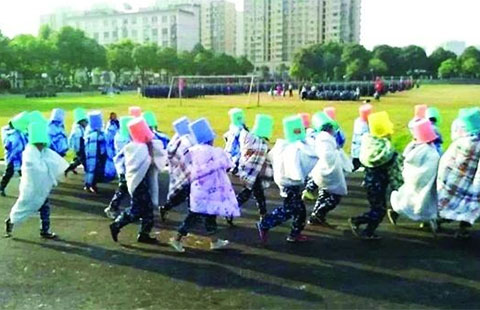Security bills a diplomatic suicide for Japan
Updated: 2015-09-19 19:37
(Xinhua)
|
||||||||
PHNOM PENH -- Academics in Cambodia have agreed that an enactment of Japanese Prime Minister Shinzo Abe- proposed contentious security bills is tantamount to a diplomatic suicide for Japan.
Their comments were made after the Japan's upper house of parliament, in which the majority is controlled by Abe's ruling bloc, passed the bills early on Saturday, despite strong disagreement by opposition parties.
Under the new bills, Japan's Self-Defense Forces, will be allowed to go into armed conflicts overseas to defend allies even if Japan itself is not attacked. The legislation will permit Japanese troops to fight abroad for the first time in 70 years.
Joseph Matthews, director of International Cooperation Department at the Asia Euro University in Phnom Penh, said the legislation is an open violation of Article 9 of Post-World War Two constitution, which bars Japan from becoming a military power again and restricting its armed forces to purely self-defense purposes.
Matthews said the laws would trigger insecurity, fear and distrust among all Asian countries, especially South East and North East Asia.
"Definitely, the enactment of this legislation is tantamount to a diplomatic suicide for Japanese foreign affairs and is a setback to all the efforts Japan is making to bring permanent and durable peace in the region and in the world," he told Xinhua.
"Undoubtedly, Japan's role as a peacemaker in the world will be questioned."
He said the bills would unleash psychological warfare among the countries that were once victims of Japanese aggression.
"Many of those who suffered in the hands of Japanese troops are still alive and their memory is very much fresh. Going down on the same path will never help Japan heal the wounds of WWII, which are as fresh as 70 years ago," he said.
According to Matthews, Japan must realize that all nations in the region are striving for economic development and integration. He said Abe's government should not do anything that can reopen the wounds of past, "which have left a scar on the forehead of Japanese nation."
Matthews said the legislation will also lead to an arm race among immediate neighbors of Japan, such as the Republic of Korea and the Democratic People's Republic of Korea (DPRK), which have experienced untold suffering when the two countries were occupied by Japan.
"All the efforts to contain the DPRK nuclear program will go down the drain once Japan will rearm," he said.
Chheang Vannarith, chairman of the Cambodian Institute for Strategic Studies, said the security measures will further complicate the already complex regional security climate.
"The bills could lead to deepen the strategic mistrust between Japan and China and other Asian neighbors which still remember the past atrocities committed by Japan during WWII," he said.
Vannarith, who is also a lecturer of Asia Pacific Studies at the University of Leeds in Britain, said the main objective of the legislation is to create a collective deterrence against China but added that this could be "counterproductive."
"It could instead promote an arm races in the region where miscalculations and miscommunication could unwittingly lead to war, " Vannarith said.
- UN chief: Those blocking fleeing refugees should 'stand in their shoes'
- Hungarian riot police detain migrants
- IOC announces five cities bid for 2024 summer Olympic
- Japan opposition to halt vote on security bills
- Japan protesters rally as security bills near passage
- Australia launches first air strikes against IS

 Across America over the week (Sept 12-18)
Across America over the week (Sept 12-18)
 House showcasing Sino-American friendship open
House showcasing Sino-American friendship open
 Top 10 M&A deals between China and US in 2015
Top 10 M&A deals between China and US in 2015
 Messy dorm earns grueling punishinment for students
Messy dorm earns grueling punishinment for students
 Seven killed in landslide in SW China
Seven killed in landslide in SW China
 Chinese forces arrive in Malaysia for military exercise
Chinese forces arrive in Malaysia for military exercise
 Top 10 M&A deals between China and US in 2015
Top 10 M&A deals between China and US in 2015
 Delicious bites in record-breaking sizes
Delicious bites in record-breaking sizes
Most Viewed
Editor's Picks

|

|

|

|

|

|
Today's Top News
Foreign media welcome, President Xi says
Japan enacts new security laws to overturn postwar pacifism
Court catalogs schools' violent crimes
'Beauty of Beijing's alleys akin to a wise, old person'
China makes progress fighting domestic, international cyber crime
Benefits system for disabled to start
Chinese premier meets with French finance minister
Premier Li's promotion of information disclosure
US Weekly

|

|







